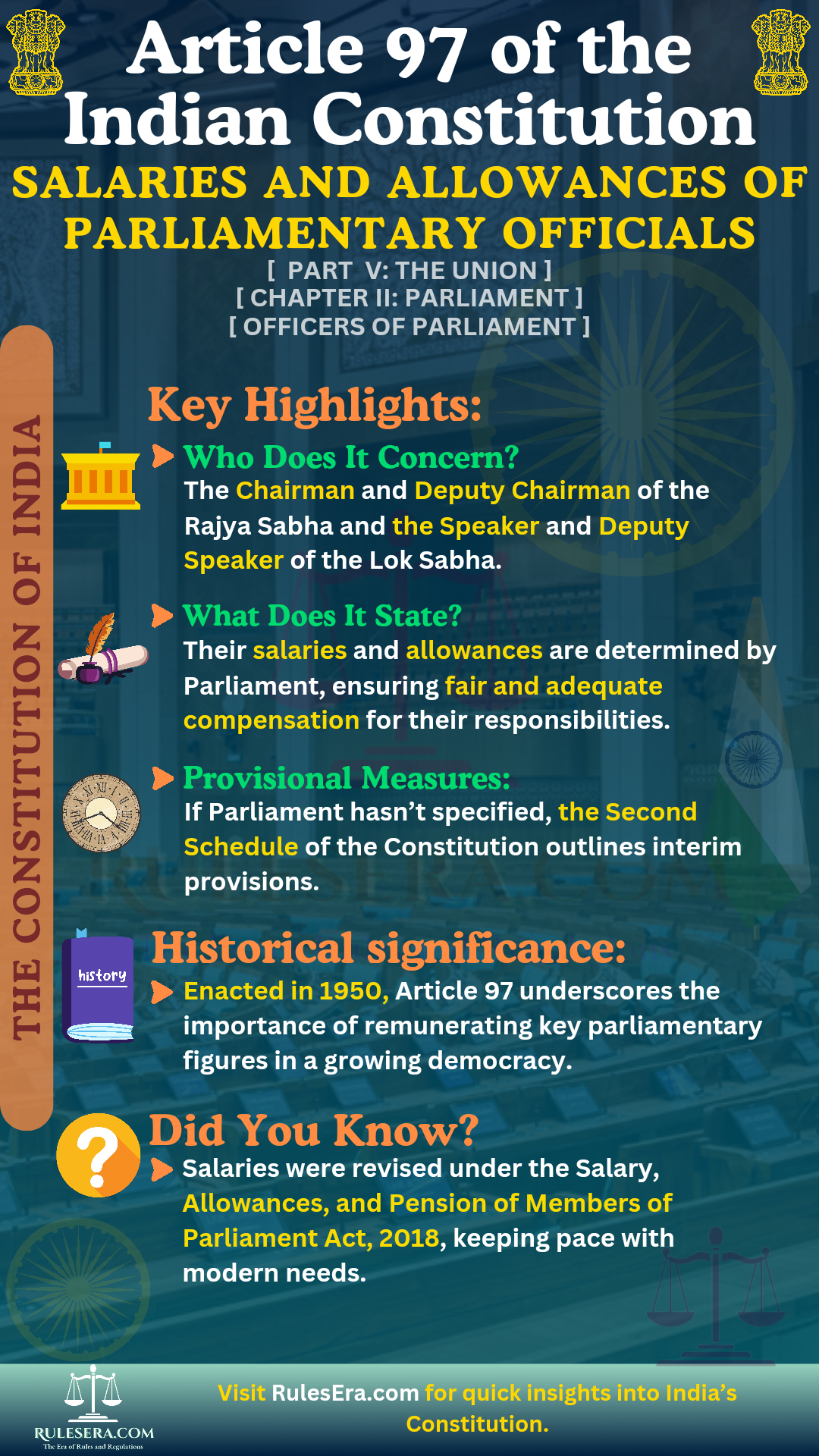Part V: The Union
Chapter I: The Executive
The Parliament
Article 97: Salaries and Allowances of the Chairman, Deputy Chairman, Speaker, and Deputy Speaker

--- Original Article ---
There shall be paid to the Chairman and the Deputy Chairman of the Council of States, and to the Speaker and the Deputy Speaker of the House of the People, such salaries and allowances as may be respectively fixed by Parliament by law and, until provision in that behalf is so made, such salaries and allowances as are specified in the Second Schedule.
Explanation
Article 97 of the Constitution of India specifies the provisions related to the salaries and allowances of the top-ranking parliamentary officials, namely the Chairman and Deputy Chairman of the Council of States (Rajya Sabha) and the Speaker and Deputy Speaker of the House of the People (Lok Sabha). This article ensures that these officials are compensated appropriately for their services, and their remuneration is determined by Parliament.
Clause-by-Clause Breakdown
- Salaries and Allowances Set by Parliament: The article states that the salaries and allowances for the Chairman, Deputy Chairman, Speaker, and Deputy Speaker shall be determined by Parliament through legislation. This gives Parliament the authority to periodically review and adjust the salaries based on the needs and circumstances of the country, ensuring that these key figures are compensated adequately for their responsibilities.
- Provisional Salaries and Allowances: The Second Schedule: Until Parliament makes specific provisions through legislation, the article ensures that the salaries and allowances of these officials are as specified in the Second Schedule of the Constitution. This ensures that there is no delay or gap in their compensation, even if Parliament has not passed specific laws regarding their salaries.
Real-Life Examples
- Example: The salaries of the Speaker of the Lok Sabha and the Chairman of the Rajya Sabha have been reviewed and revised multiple times by Parliament. For instance, the Salary, Allowances and Pension of Members of Parliament Act was amended in 2018 to revise the salaries of parliamentary officials, ensuring their remuneration was in line with current standards.
- Example: The Second Schedule of the Constitution contains detailed provisions regarding the salaries and allowances of high-ranking officials, including the Speaker, Deputy Speaker, Chairman, and Deputy Chairman. These provisions were designed to ensure that, in the early years of the Republic, such officials would be adequately compensated, even before Parliament passed specific salary laws.
Historical Significance and References
Article 97 is a key constitutional provision that reflects the importance of ensuring appropriate remuneration for the country’s top parliamentary leaders. The salaries of these officials are directly linked to the functioning of India’s democratic institutions. The article also highlights the role of Parliament in regularly assessing and adjusting the financial compensation of its leaders.
The Second Schedule was crucial when the Constitution came into force in 1950, as it provided a temporary solution for salaries until specific laws were passed by Parliament. The framers of the Constitution, recognizing the evolving nature of the country’s economic and political landscape, left this decision to be revisited and updated by future legislative action.
References
- Constitution of India, Article 97
- Second Schedule, Constitution of India
- D.D. Basu, Introduction to the Constitution of India
- The Salary, Allowances and Pension of Members of Parliament Act, amended 2018
Legislative History
Article 97 of the Indian Constitution, initially drafted and deliberated as article 79 of the Draft Constitution, was included in the Indian Constitution on May 19, 1949.
Debates and Amendments
This article was adopted unchanged by the Constituent Assembly as there were no amendments or discussions during the introduction of this provision.
Frequently Asked Questions (FAQs):
The salaries and allowances of the Speaker and Chairman are determined by Parliament through specific legislation. Parliament can review and adjust these amounts based on the nation's needs.
In the absence of specific legislation, the salaries and allowances of the Speaker, Chairman, and their deputies are determined by the provisions outlined in the Second Schedule of the Constitution.
Yes, Parliament has the authority to change and revise the salaries of the Speaker, Deputy Speaker, Chairman, and Deputy Chairman through legislative amendments.